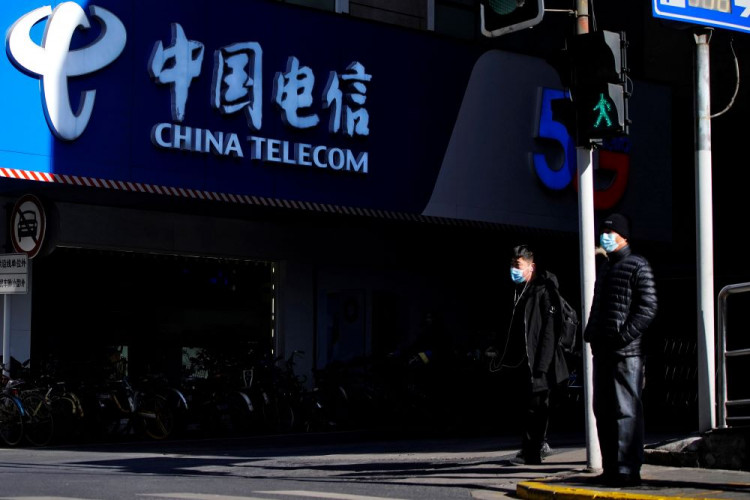Reuters - World share-price tracking companies MSCI, Inc. and FTSE Russell said they would cut three China telecommunications companies from their indexes between Friday and Jan. 11 in response to a U.S. investment ban - crushing their share prices.
The deletions add to the suite of companies already cut from indexes because of the U.S. ban and it likely requires passive investors, such as index tracking funds, to sell stocks of China Mobile, China Telecom and China Unicom Hong Kong.
All three companies have many passive investors and their share prices fell Friday - wiping out nearly $10 billion in value by the midday break in Hong Kong in the clearest illustration yet of the investment fallout from the U.S. rules.
In separate statements dated Jan. 7, MSCI said it would remove the companies from its China indexes Friday and FTSE Russell said they would be cut from its Global Equity Index series and China A indexes Monday.
China has condemned the move as an oppression of its companies and several of the affected firms have denied military ties.
The latest deletions followed the New York Stock Exchange confirming it would delist U.S.-traded American depositary shares of the three telcos Jan. 11.
That came after the U.S. Treasury clarified that the investment ban extends to subsidiaries with similar names to 35 companies on a Defense Department list of China companies it says have military links.
Meanwhile, Asia share indexes rose to record highs Friday, with Japan's Nikkei hitting a three-decade peak as investors looked beyond rising coronavirus cases and political unrest in the United States to focus on hopes for an economic recovery later in the year.
The upbeat mood came after Wall Street hit record highs Thursday while bond prices fell as markets bet a new Democratic-controlled government would lead to heavy spending and borrowing to support the U.S. economic recovery.
"Market participants are fairly optimistic with how things are progressing, whether it's in the political landscape, particularly of course in the United States the potential for more stimulus certainly is a boon to the economy," said James Tao, analyst at CommSec in Sydney. "You've got the vaccines now coming through, getting the approvals - it's all happening pretty quickly," he added.
The buoyant mood lifted MSCI's broadest index of Asia-Pacific shares outside Japan up 1%, touching a record high.
Seoul's Kospi led the way, charging 2.8% higher, also to a record high. In Tokyo, the Nikkei added 1.73%, hitting its highest level since August 1990.
Hong Kong's Hang Seng rose 1.2% despite reports the Trump administration was considering banning U.S. entities from investing in an expanded list of Chinese companies in the waning days of the presidency, and despite the delisting of major Chinese telecoms firms from FTSE Russell and MSCI indexes.
China blue chip shares were flat after recent gains and Australia's S&P/ASX 200 rose only 0.48% after the state of Queensland enforced a three-day lockdown in its capital Brisbane following the discovery of a case of the more contagious UK variant of COVID-19.
On Thursday, the Dow Jones Industrial Average rose 0.69%, the S&P 500 gained 1.48% and the Nasdaq composite added 2.56% - with all three indexes finishing at record closing highs.
U.S. government officials have begun weighing removing Trump from office before Biden's inauguration date of Jan. 20, after Trump supporters stormed the U.S. Capitol building.
Rising risk appetite weighed on bonds, pushing benchmark U.S. yields higher. Ten-year notes yielded 1.0998% Friday, up from 1.017% Thursday. The 30-year bond yielded 1.8817%, up from 1.845% Thursday.
The dollar also strengthened on hopes of a meaningful economic recovery later this year.
The dollar index edged up against a basket of currencies to 89.875 with the euro down 0.11% to $1.2256.
Cryptocurrency bitcoin fared less well, dropping more than 5% to $37,377 after topping $40,000 for the first time Thursday on high demand from institutional and retail investors. Market watchers have said a pullback is likely following its recent run-up.
In commodity markets, oil traders continued to focus on Saudi Arabia's pledge to deepen production cuts.
Brent crude was up 0.39% at $54.59 a barrel after touching $54.90, a high not seen since before the first COVID-19 lockdowns in the West. U.S. West Texas Intermediate rose 0.45% to $51.06.
Spot gold was about 0.1% lower at $1,910.87 per ounce.





